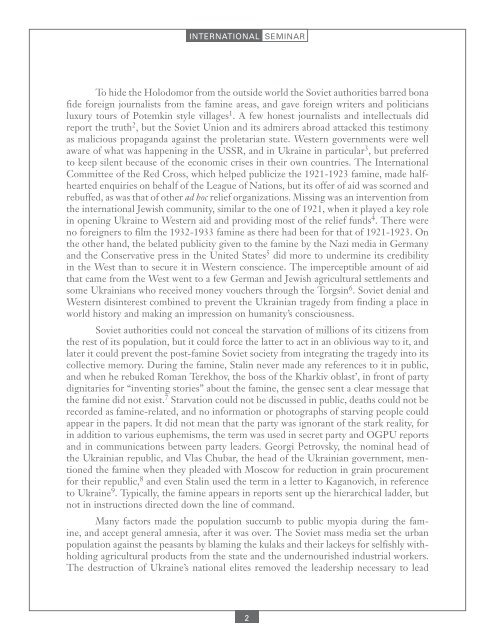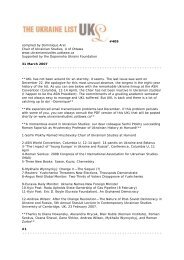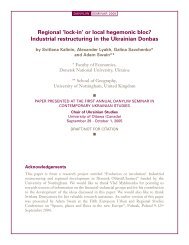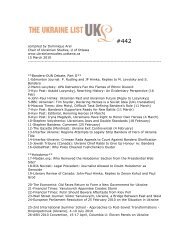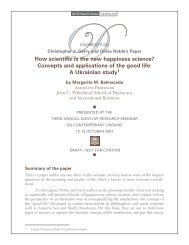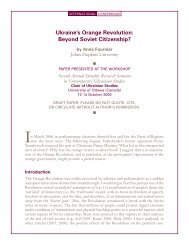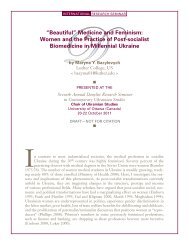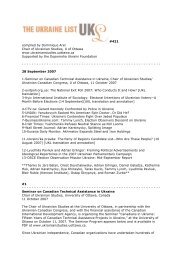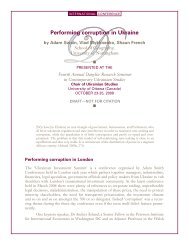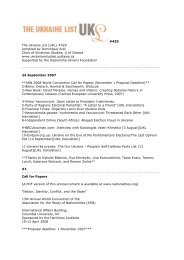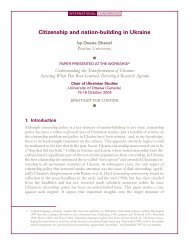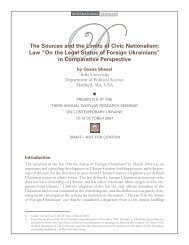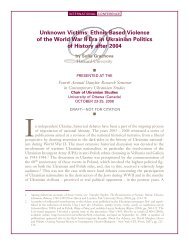Competing Memories Of Communist And Nazi Crimes In Ukraine
Competing Memories Of Communist And Nazi Crimes In Ukraine
Competing Memories Of Communist And Nazi Crimes In Ukraine
Create successful ePaper yourself
Turn your PDF publications into a flip-book with our unique Google optimized e-Paper software.
international SEMINAR<br />
To hide the Holodomor from the outside world the Soviet authorities barred bona<br />
fide foreign journalists from the famine areas, and gave foreign writers and politicians<br />
luxury tours of Potemkin style villages 1 . A few honest journalists and intellectuals did<br />
report the truth 2 , but the Soviet Union and its admirers abroad attacked this testimony<br />
as malicious propaganda against the proletarian state. Western governments were well<br />
aware of what was happening in the USSR, and in <strong>Ukraine</strong> in particular 3 , but preferred<br />
to keep silent because of the economic crises in their own countries. The <strong>In</strong>ternational<br />
Committee of the Red Cross, which helped publicize the 1921-1923 famine, made halfhearted<br />
enquiries on behalf of the League of Nations, but its offer of aid was scorned and<br />
rebuffed, as was that of other ad hoc relief organizations. Missing was an intervention from<br />
the international Jewish community, similar to the one of 1921, when it played a key role<br />
in opening <strong>Ukraine</strong> to Western aid and providing most of the relief funds 4 . There were<br />
no foreigners to film the 1932-1933 famine as there had been for that of 1921-1923. On<br />
the other hand, the belated publicity given to the famine by the <strong>Nazi</strong> media in Germany<br />
and the Conservative press in the United States 5 did more to undermine its credibility<br />
in the West than to secure it in Western conscience. The imperceptible amount of aid<br />
that came from the West went to a few German and Jewish agricultural settlements and<br />
some Ukrainians who received money vouchers through the Torgsin 6 . Soviet denial and<br />
Western disinterest combined to prevent the Ukrainian tragedy from finding a place in<br />
world history and making an impression on humanity’s consciousness.<br />
Soviet authorities could not conceal the starvation of millions of its citizens from<br />
the rest of its population, but it could force the latter to act in an oblivious way to it, and<br />
later it could prevent the post-famine Soviet society from integrating the tragedy into its<br />
collective memory. During the famine, Stalin never made any references to it in public,<br />
and when he rebuked Roman Terekhov, the boss of the Kharkiv oblast’, in front of party<br />
dignitaries for “inventing stories” about the famine, the gensec sent a clear message that<br />
the famine did not exist. 7 Starvation could not be discussed in public, deaths could not be<br />
recorded as famine-related, and no information or photographs of starving people could<br />
appear in the papers. It did not mean that the party was ignorant of the stark reality, for<br />
in addition to various euphemisms, the term was used in secret party and OGPU reports<br />
and in communications between party leaders. Georgi Petrovsky, the nominal head of<br />
the Ukrainian republic, and Vlas Chubar, the head of the Ukrainian government, mentioned<br />
the famine when they pleaded with Moscow for reduction in grain procurement<br />
for their republic, 8 and even Stalin used the term in a letter to Kaganovich, in reference<br />
to <strong>Ukraine</strong> 9 . Typically, the famine appears in reports sent up the hierarchical ladder, but<br />
not in instructions directed down the line of command.<br />
Many factors made the population succumb to public myopia during the famine,<br />
and accept general amnesia, after it was over. The Soviet mass media set the urban<br />
population against the peasants by blaming the kulaks and their lackeys for selfishly withholding<br />
agricultural products from the state and the undernourished industrial workers.<br />
The destruction of <strong>Ukraine</strong>’s national elites removed the leadership necessary to lead<br />
2


